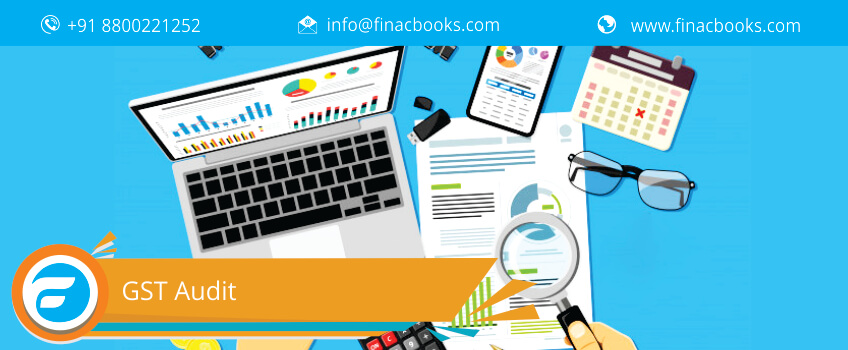Home / GST Audit
Audit under GST
It is the process of analyzing the records, documents and returns maintained by taxpayers as per GST laws. The main purpose of doing audit under GST is to verify accuracy of turnover, payment of taxes, claiming of refunds and availing of input tax credit under GST provisions laid down by the central government. It is also considered as first external assessment undertaken by the auditors under GST law.
We at FinacBooks provide comprehensive reviews of all your GST records by analyzing your turnover, tax payment, refund claiming & availing of input tax credit. Not only this, we also suggest you various measures to strengthen your internal controls by providing appropriate way of recording, entering & analyzing data which ensures company growth.
What is GST Audit?
As per section 35(5) of the CGST act, every registered taxpayer whose turnover is more than Rs 2 Crores in a particular financial year needs to get their books of accounts audited from a practicing chartered accountant or cost accountant. Registered taxpayer needs to submit copy of audited financial statements & reconciliation statement in form GSTR 9C. It is required bythe tax department once in a financial year.

Persons Liable For GST Audit
Persons who are registered taxpayers and whose turnover exceeds GST limit of Rs 2 Crores in a particular financial year are liable for GST audit. It is mandatory for such persons to get their accounts audited from a practicing chartered accountant or a cost accountant. GST turnover limit of Rs 2 Crores is same across all states & UT’s for registered taxpayers.
Aggregate turnover of a registered taxpayer includes –
- Exports
- Inter-state supplies
- Stock transfers
- Exempt supplies
Above mentioned supplies are exclusive of GST & compensation cess.
How to Prepare for Audit under GST?
You need to take care of the following points while preparing for audit under GST –
The main objective of the auditor in GST audit is to ensure that business is complying with all E-way bill provisions and effective measures are suggested to avoid legal complications.
GST Audit Checklist
Mandatory GST audit checklist which should be strictly followed is as follows –
Types of GST Audit
| Types | When initiated | Performed by |
| Normal Audit/General Audit | Need to give 15 days prior notice on the order of commissioner | CGST/SGST commissioner or any authorized officer |
| Turnover Audit | Taxpayers having turnover of more than Rs 2 Crores must get their books of accounts audited | Any chartered accountant or cost accountant appointed by the taxpayer |
| Special Audit | On order of deputy commissioner with prior approval of commissioner | Any chartered accountant or cost accountant nominated by commissioner |
Turnover-based GST Audit under Section 35(5) of CGST Act
As per section 35(5) of CGST act, any registered taxpayer having turnover of more than Rs 2 Crores in a financial year must get their books of accounts audited every year from a chartered accountant or a cost accountant. Financial year is 12 months period starting from 1st April to 31st March of the next year. There is a specified formula for calculating the aggregate turnover of a company which are as follows –
Aggregate turnover = value of all taxable (inter-state & intra-state) supplies + exempt supplies + export supplies of all goods & services.
| Items included while calculating turnover | Items excluded while calculating turnover |
Read Also: Reverse Charge Mechanism under GST
GST Audit by Tax Authorities
Obligations of the Auditee
Obligations include what are the responsibilities of an auditee or what an auditee required to do. The taxable person needs to perform the following responsibilities –
Audit findings
After concluding the audit, audit officer prepares a audit report within 30 days containing the following –
Recovery actions will be initiated by the auditor in case of unpaid tax or short payment of tax or wrong input tax credit availed or wrong refund processed.
Special Audit
When special audit is required?
A special audit may be required in the following circumstances –
Special audit can also be conducted in case the taxpayer books of accounts are already been audited before.
Who will order for Special Audit?
Assistant commissioner can order for special audit in writing by taking prior approval from the commissioner.
Who will carry Special Audit?
Special audit is carried out by a Chartered Accountant/Cost Accountant nominated by the commissioner.
What is the time limit for Special Audit?
Auditor doing special audit needs to submit the report within 90 days. It may be extended further by the tax officer for 90 days on the application request made by the taxable person or by the auditor.
Who will pay the cost of Special Audit?
The expenses incurred by the auditor during the audit process are borne by the commissioner. It also includes remuneration given to the auditor.
Findings of Special Audit
Findings of special audit mean the positive/negative results obtained by the auditor after analyzing the records of the taxpayer. Taxpayer will also provide an opportunity of being heard by the auditor in findings of the special audit.
Recovery action may also be taken by the auditor in the following cases –
- Unpaid tax
- Short payment of tax
- Input tax credit wrongly availed
- Wrong refund
Differences between Statutory Audit, Departmental Audit, Special Audit and Management Audit
| Basis of Distinction | Statutory Audit | Departmental Audit | Special Audit | Management Audit/reviews |
| Scope | Books of accounts are examined | Books of accounts are examined | Books of accounts are examined keeping in mind the notice received by the taxpayer | Books of accounts are verified or special investigation can be done on assesse’s demand |
| Appointment (Auditors) | Appointed by the taxpayer | Appointed by the department | Appointed by the Scrutiny officer | Appointed by the taxpayer |
| Fees | Auditor is hired by the taxpayer. Hence, taxpayer will pay the fees | N/A | Auditor is hired by the officer. Hence, officer will pay the fees. | Auditor is hired by the taxpayer. Hence, taxpayer will pay the fees. |
| Time allotted for audit | On or before 31st December | 3 months are allotted but it may extend further to 6 months (Maximum) | 90 days are allotted but it may extend further to 90 days. | Time allotted is mentioned in the audit engagement lette. |
What are the Documents required for GST Audit?
The documents required for GST audit are as follows –
Forms for Annual Return and GST Audit
| Type of taxpayer | Form to be filed |
| Is it applicable to GST audit? | |
| For Regular taxpayers filing form GSTR 1 and GSTR 3B | GSTR 9 |
| For Taxpayers using composition scheme | GSTR 9A |
| For E-commerce operators | GSTR 9B |
| Applicable for GST Audit | |
| Taxpayers having turnover of more than Rs 2 Crores in a FY | GSTR 9C |
Due Dates for Submission of GST Audit Report
There are 2 main GST reports prepared in GST audit –
| Report | Type of taxpayer | Due date |
| GSTR 9A | Normal taxpayer | On or before 31st December |
| For Taxpayers using GSTR 9C | Taxpayers having turnover above Rs 2 Crores | On or before 31st December |
Penalty for not submitting GST Audit Report
There is no specific provision created to penalize a taxpayer on non-submission of GST report. Hence, a general penalty of Rs 25,000 will be applied on the taxpayer.
What Is Included In Our Package?
Eligibility Consultation
Document Preparation
Application Drafting
Government Fees
GST Audit FAQ’s
As per u/s 35(5) of the CGST act, following persons can do audit under GST –
- Chartered accountant
- Cost accountant
How FinacBooks helps in GST Audit?
Finacbooks is one of the leading Indian firms with more than 10 years of experience in helping businesses with GST audit. To avail the best deals on GST audit, kindly call us at 8800221252 or you can also e-mail us at info@finacbooks.com
What Clients Say

Prakash Verma


Praveen Chauhan


Pradeep Kochhar

Blogs
In today's dynamic business landscape, navigating through various regulatory requirements and financial obligations can be... Read More
FinacBooks is a reliable platform that helps business owners in getting verified leads. It offers various services and solutions that can... Read More
Starting a new business in India requires several legal procedures, paperwork, and timely compliance with regulatory authorities. Company... Read More








